Pure Mustard Oil - Tori ko Tel (तोरी को तेल)
 |
| Field of bright yellow mustard plant in full bloom in Chitwan area, Nepal |
Mustard oil is an extremely pungent, yellow-colored oil that comes from pressed mustard seeds (Brassica juncea). In the raw stage, the oil has a bitter, sharp flavor, but once it is heated to the smoking point, the pungency mellows and the oil imparts a delicious flavor to foods that are cooked with the oil. Mustard oil is used as the primary cooking oil in many Nepali households. Nepalese also apply mustard oil to hair to promote healthy growth and use it to as a massage oil for relief from aches and pains.
Good quality Mustard oil stores well. It is used in deep-frying and also as a natural preservative in many pickles and chutneys. Furthermore, many Nepali Sandheko dishes (salad-like dishes), stir-fries employ mustard oil to provide added flavor.
What is mustard oil?
Mustard oil is formed from pressing the seeds of a mustard plant to supply a spicy oil. Mustard oil is popular in Eastern cooking, although some American chefs have begun experimenting with the oil, which features a heat and distinctive flavor thereto.
Real mustard oil, however, is really banned for cooking uses by the FDA. this is often because it contains an ingredient called erucic acid that has been shown to cause heart problems. Erucic acid may be a carboxylic acid that it's not well metabolized. It’s considered a contaminant.
Although the oil hasn't actually been tested in humans, the FDA still doesn't allow it to be sold for food purposes legally within the us .
However, the FDA does allow a special sort of oil, called mustard volatile oil , to be sold for cooking. Mustard volatile oil is formed from steam distillation of mustard seeds. It’s considered safe to be used in cooking by the FDA.
Mustard oil and mustard essential oils are completely differing types of oil, although they're both derived from mustard seeds. Both mustard oil and mustard volatile oil are safe to be used as massage oil. In fact, mustard oil is employed extensively in countries like India without reported negative reactions or harmful side effects.
How to use mustard oil
There are dangers of using real mustard oil as a dietary supplement or for cooking. It shouldn't be utilized in anything which will be consumed. However, you'll use it as a massage oil.
Mustard volatile oil is out there for purchase at any food store or online. To use a mustard volatile oil , dilute it with lighter oils. Then, apply it to affected areas on the body. It also acts as a mosquito repellant. For this use, apply the diluted oil on your pulse points. The oil can even help make your hair healthier and shinier.
Used appropriately, mustard oil and mustard volatile oil have several health benefits.
Helps repel harmful bacteria
Mustard volatile oil has been found to be a strong antibacterial agent. One study Trusted Source found that mustard volatile oil effectively killed off common and harmful bacteria like E. coli, salmonella, staph, listeria, and even a particular sort of yeast. It also can be used as an anti-fungal.
Decreases inflammation
According to the ISJR, mustard volatile oil has great anti-inflammatory properties. Historically, mustard oil has been used to: treat arthritis, soothe aches and pains, decrease inflammation from chest conditions like bronchitis and pneumonia
Relieves body pain
One interesting study Trusted Source checked out using mustard oil to alleviate widespread and chronic body pain in mice. The researchers found that mustard oil works against certain pain receptors within the body. meaning it can block some pain signals. More research must be done before we will say that mustard oil works an equivalent way in humans, but it is a hopeful idea as an easy thanks to treat widespread pain.
Mustard volatile oil can help lower blood heat by stimulating sweat glands. This makes it useful for reducing fever.
Risks and warnings
Pure, unregulated mustard oil are often pretty dangerous stuff. for instance , one studyTrusted Source found that mixing unadulterated mustard oil with argemone oil, a mixture sometimes found in Indian food, can destroy red blood cells within the body. Any mustard oil that's contaminated with argemone oil is taken into account dangerous to humans.
When using mustard volatile oil , you’ll also want to observe for allergies. Test alittle amount of the volatile oil on the skin faraway from your face or lungs. Wait 24 hours to ascertain if you've got a reaction before applying a bigger amount. like any essential oils, you ought to not use mustard volatile oil on infants.
The bottom line
You can find both mustard oil and mustard volatile oil in exotic food retailers or through online vendors. Research questions the security of mustard oil for cooking, and it'd be best avoided, especially for young children or pregnant women. In fact, the FDA prohibits selling the oil for this purpose.
Using a mustard volatile oil on your skin, however, is safe. it's going to provide health benefits like pain relief and infection prevention.
My Experience:
I am here today to share my trip to Mustard Seed Pressing Plant in Kathmandu, Nepal. These photos are captured from the Everest Tori Mil, Kathmandu, Nepal. The mill owner is Mr. Balram Karki and he has been in the business for the past seventeen years. I would like to thank him for showing me his factory and teaching me how the seeds are pressed into oil.
He says that all the quality mustard seeds came from Citwan, Nawalparasi, and Dang-Bardia District, Nepal. I am really excited to share the pictorial tour of one of the most loved cooking oil of Nepal, Mustard oil - Tori ko Tel (तोरी को तेल). Here is a pictorial tour of the oil pressing plant. I hope you enjoy watching a real old-fashion way of pressing the mustard seed to extract the oil.
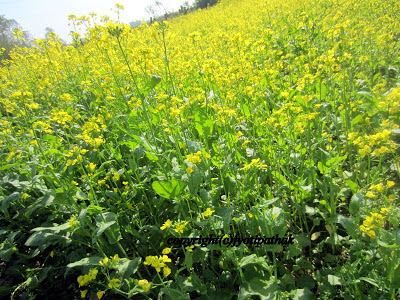
Field of bright yellow-gold colored mustard plant in Gitanagar, Chitwan District of Southern Nepal. Chitwan is famous in Nepal because of its dominant production of mustard from which mustard oil is produced. .........More on the Chitwan district...
|
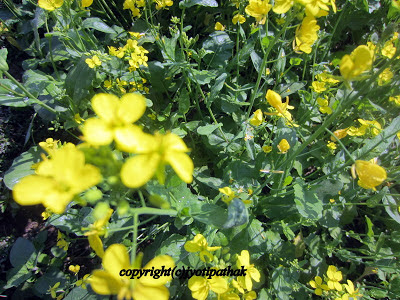 | |
| Close-up look of clusters of yellow Mustard flower blooms |
 |
| Everest Tori Mill, Maitidevi, Dhobi Khola,Kathmandu, Nepal |
 |
| A room filled with Mustard seeds stored in a jute sacks at Everest Tori Mill |
 |
| Another room full of more Mustard seeds in yellow plastic sacs, already cleaned and ready to be poured into the machine. |
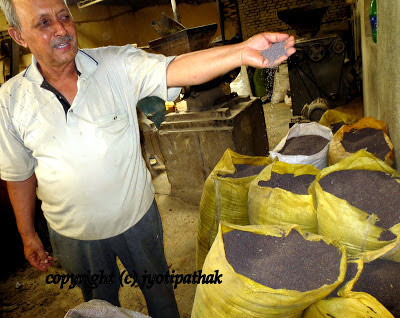 |
| Mr. Karki is showing his quality seeds that just arrived from Dang-Bardia District of Nepal. He says, "look! the seeds are pressed right in front of the customers to extract amber colored oil. |
 |
| Mustard seeds - in my previous blog, I have more images and information of different varieties of Mustard seeds. Please check it out. |
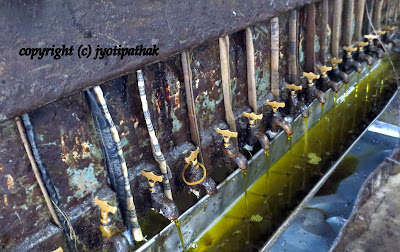 |
| Mustard oil extraction process - In the above pictures, I observed the cold pressing method of extracting the oil from mustard seeds. |
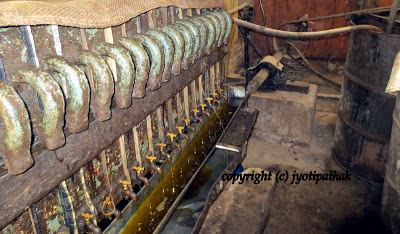 |
| This is one of the simplest way of crushing the seeds directly to extract the oil. It is so much fun to watch how the pressed oil comes out. |
 |
| When the seeds are processed into oil, a by-product is obtained which is called mustard seed pressed cake and Peena in Nepali. |
 | |
| Mustard seeds pressed cakes (Peena) is used in many ways - used for cattle feed, fertilizer, some people wash their hair and face. |
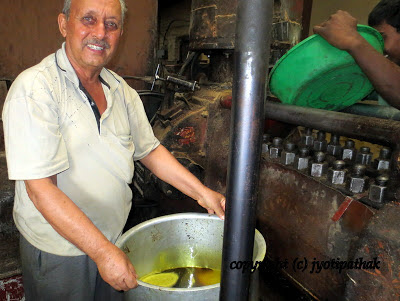 |
| Collecting the oil.... |
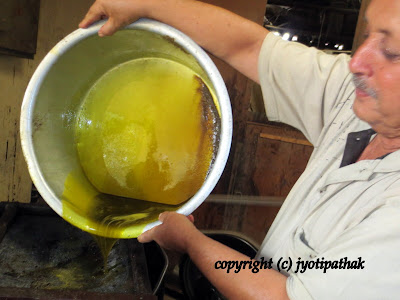 |
| ...pouring through filter |
 | |
| The final packaging - pure mustard oil is getting ready to be poured up into the bottle. |
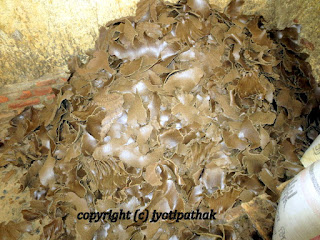 | ||
| The by-product of the oil left in the floor of the mill is in high in demand. They were selling for Rs 28.00 per kilo. |
+Dinner+pra-mary+028.JPG) |
| My trip to another mustard oil pressing factory in Kathmandu where they produce roasted mustard oil or Bhuteko tori ko tel-भुटेको तोरीको तेल A cold pressed oil is more stronger than the roasted oil. |
+Dinner+pra-mary+025.JPG) |
| .....ready for final packaging |
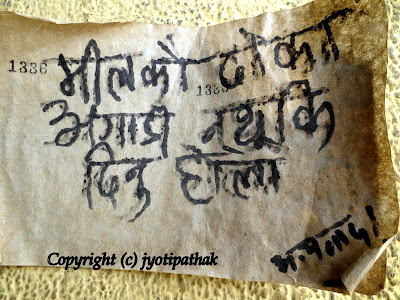 | ||||
| A hand written friendly sign in Nepali was posted just outside the Everest Tori Mill, which translates to - "Please do not spit in front of the door of the oil mill. Thank you." |
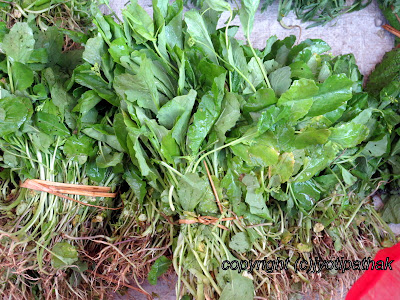 |
| Locally grown Mustard Greens (Tori ko Saag) came from the valley |
 |
| Mustard Greens on the way to the market |
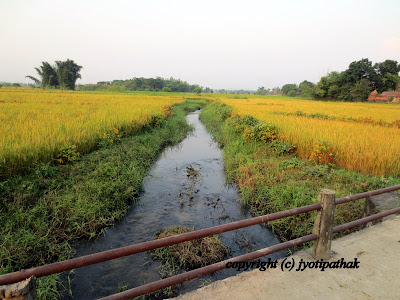 | |
| Beautiful view of fully blooming Mustard Flowers at Gitanagar, Chitwan District, Narayani Zone of Southern Nepal |
Here are some of the useful and informative links about Mustard seeds and oil.
- American Chefs Discover Mustard Oil
- Brown Mustard (Brassica Juncea)
- Mustard Plant
- Blog Posting Taste of Nepal
Copyright Information
All information on the blog are restricted use under copyright law. You may not re-use words, stories, photographs, or other posted material without the explicit written consent and proper credit to newnepaldream.blogspot.com. If you would like to use any materials here, please contact me.



+Dinner+pra-mary+026.JPG)